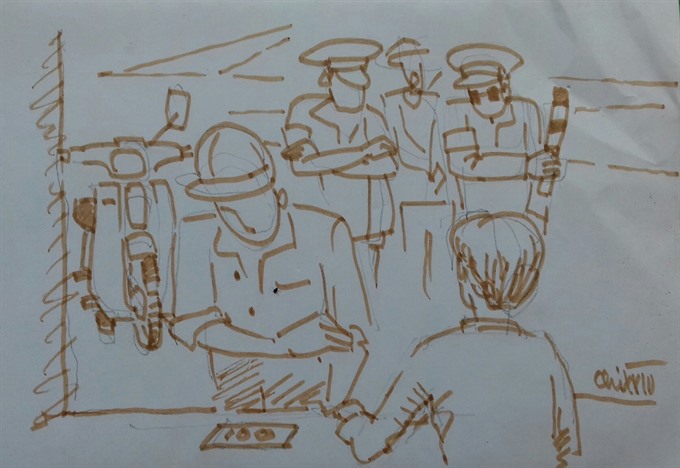 Talk Around Town
Talk Around Town

The unofficial foreign currency exchange market has long operated in Việt Nam. But it is in the public eye this week after a shocking case in which a man was heavily fined for trying to exchange US$100. The 38-year-old electrician from the southern city of Cần Thơ faces a hefty fine of up to VNĐ90 million (US$3,846) after exchanging a $100 note for VNĐ2.26 million in a gold shop which was not licensed by the State Bank of Việt Nam to exchange foreign currency.
 |
Thu Hằng
The unofficial foreign currency exchange market has long operated in Việt Nam. But it is in the public eye this week after a shocking case in which a man was heavily fined for trying to exchange US$100.
Nguyễn Cà Rê, a 38-year-old electrician from the southern city of Cần Thơ, faces a hefty fine of up to VNĐ90 million (US$3,846) after exchanging a $100 note for VNĐ2.26 million in a gold shop which was not licensed by the State Bank of Việt Nam (SBV) to exchange foreign currency.
The gold shop was also slapped with a penalty of VNĐ180 million for providing the service.
Like Rê, many other residents said they did not know about the rule until the case was reported by local media.
Nguyễn Văn Minh, a resident in Hoàng Mai District’s Lĩnh Nam Ward, said he was surprised by news because he often went to jewellery stores to change US dollars and other foreign currency.
“Exchanging money via unofficial channels is something Vietnamese people have been doing for years, and I have never known anyone to be punished,” Minh said. “I did not know about the ban on exchanging foreign currency at unlicensed outlets or that such violations could result in fines of up to VNĐ100 million. And I still do not know which outlets are legal.”
An owner of a jewellery shop on Vĩnh Hưng Street, Hoàng Mai District, Mai Thanh Liêm, said buying and selling of foreign currency has been common for a long time even though it was illegal.
Gold shops on Hà Trung Street, Hoàn Kiếm District, a popular currency exchange destination in Hà Nội, also offered the same service, he said.
Not all gold shops are licensed to buy foreign currency but this still happens every day because it is difficult for enforcement agencies to control, Liêm said.
“Where there is demand, there will be supply,” said Liêm. “The bank requires customers to go through a complicated process to exchange money during office hours while gold shops can offer quicker and more convenient service.”
He said the man’s punishment was legal but very unusual.
I agree.
I suppose it is the fault of residents, because they lack knowledge of the law, and also the fault of State agencies.
Nguyễn Chiến, a National Assembly delegate and vice chairman of the Việt Nam Bar Association, said the case showed shortcomings in applying legal regulations and demonstrated the weakness of State management in currency transfers. He said punishing unlicensed exchanges was legitimate, but relevant agencies were responsible for making sure people know the laws.
“If many illegal currency exchange points still exist, it is the responsibility of the Sate management agencies. And the regulation has not been strictly enforced,” he said at the final working session of two days of socio-economic discussions in parliament last week.
He suggested revising the sanction.
Under the law issued by the Government in 2014 to set punishments for violating administrative regulations on currencies and banking, fines for the exchange of foreign currencies at unlicensed organisations range from VNĐ80 million to VNĐ100 million. Authorities are also eligible to confiscate the foreign currencies.
Only banks are licensed to trade and exchange foreign currencies. Some jewellery stores are authorised by banks to act as exchange agents; however, they are eligible to buy foreign currencies but not to sell them.
According to Nguyễn Ngọc Đông, director of the SBV’s Foreign Currency Management Department, exchange services are available in many locations. As of the end of September this year, the SBV had licensed 580 exchange stores nationwide across urban and rural areas.
Under SBV regulations, banks must publicise the lists of official exchange outlets on their websites, Đông said.
NA deputy Mai Thị Phương Hoa agreed with Chiến, adding the case revealed that regulations were not always enforced properly.
Laws should adapt to changing times and the needs of the people they cater to.
Hoa Hữu Lân, former head of the Research Division for Cultural and Social Development at the Hà Nội Institute for Socio-Economic Research, said the law should be revised if it is too rigid.
If it is too strict, people will seek ways to avoid the law, resulting in violations.
This fine was too heavy, he told the Khoa học & Đời sống (Science & Life) newspaper.
The penalty should be applied on a case-by-case basis. Lân added that the violation was not as serious as breaking traffic or food safety laws.
Deputy Prime Minister Trương Hòa Bình said on Saturday that SBV should look into the legality and appropriateness of the heavy fine.
Trần Quốc Hà, director of the SBV’s Cần Thơ branch, worked with the city’s People’s Committee to find a solution.
After the discussion, Hà said this was the first time Rê had violated the law. Rê’s knowledge of the law was limited and he was reportedly unable to pay the fine as his monthly electrician’s salary is just above VNĐ3 million, so the People’s Committee should consider reducing or eliminating his fine and returning his $100.
This does not mean poor people can break the law without consequences. Rich and poor alike should be strictly punished for violating laws, I think.
Unfortunately, people still have limited knowledge of the laws.
As this story demonstrates, full understanding of all aspects of the law is important. – VNS




